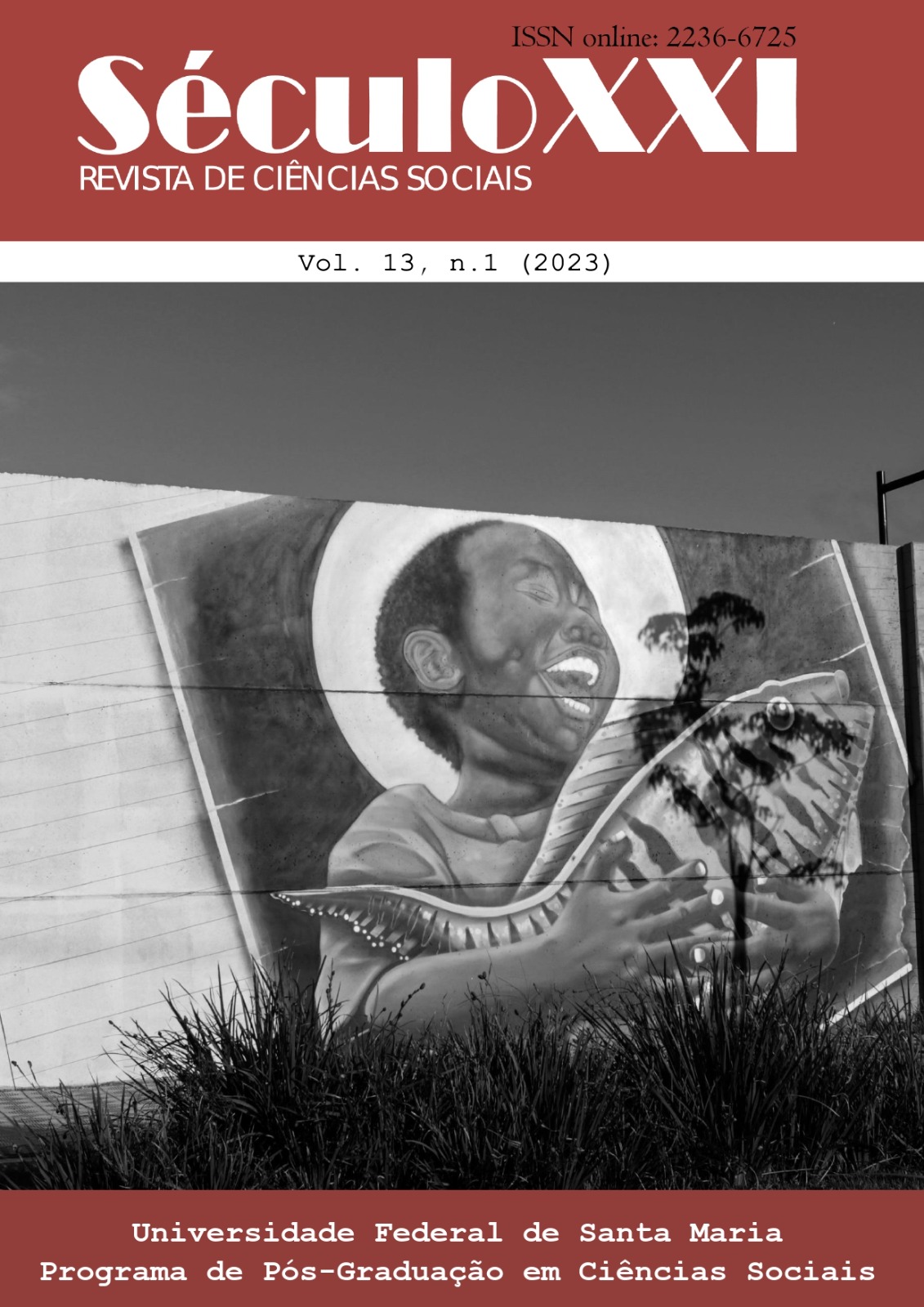Implications when building a method to search subordinated work by application
DOI:
https://doi.org/10.5902/2236672586444Keywords:
App, Food delivery, Participant observation, Digital information and communication technology, LabourAbstract
With the purpose of understanding app-based food delivery work between the second semester of 2022 and the first semester of 2023, one of the authors of this article, after constructing the method, set out to produce data through participant observation. It consisted, therefore, of generating data by willingly submitting to an app and working in food delivery for the purpose of comprehension. This approach to conducting the research was based on analogous experiences, specifically those conducted by Linhart (1986), Wacquant (2002), and Cant (2021). In this process, implications in the method construction were perceived due to the research involving an app, characterized as a Digital Information and Communication Technology (DICT). It is the discussion of these implications that guides the present article. To achieve this goal, we present how the method was constructed, followed by five implications that were perceived and discussed during the research process. It was concluded that methods for researching app-based subordinate work should allow for a reflective and flexible stance, accompanied by rigor capable of guiding the research.
Downloads
References
ABÍLIO, L. C.; AMORIM, H.; GROHMANN, R. Uberização e plataformização do trabalho no Brasil: conceitos, processos e formas. Sociologias, v. 23, n. 57, p. 26-56, 2021. Disponível em: https://doi.org/10.1590/15174522-116484. Acesso em: 10 nov. 2022 DOI: https://doi.org/10.1590/15174522-116484
ANTUNES, R. Riqueza e miséria do trabalho no Brasil IV: trabalho digital, autogestão e expropriação da vida. 1. ed. São Paulo: Boitempo, 2019.
BENJAMIN, W. Charles Baudelaire um lírico no auge do capitalismo. São Paulo: Brasiliense, 1994.
BENNATO, D. The Digital Traces’ Diamond. A Proposal to Put Together a Quantitative Approach, Interpretive Methods, and Computational Tools. Italian Sociological Review, v. 11, n. 4, p. 207-224, 2021. Disponível em: https://doi.org/10.13136/isr.v11i4S.432. Acesso em: 15 de out. 2022.
CANT, C. Delivery Fight! A luta conta os patrões sem rosto. Tradução de Alexandre Boide. São Paulo: Veneta, 2021.
DARDOT, P.; LAVAL, C. A nova razão do mundo: ensaios sobre a sociedade neoliberal. 1a ed. São Paulo: Boitempo, 2016.
FLORIDI, L. “A era do Onlife, onde real e virtual se (com)fundem”. Entrevista com Luciano Floridi. 2019. Disponível em: https://ihu.unisinos.br/593095-luciano-floridi-vou-explicar-a-era-do-onlife-onde-real-e-virtual-se-com-fundem. Acesso em: 17 jan. 2023.
IBGE – INSTITUTO BRASILEIRO DE GEOGRAFIA E ESTATÍSTICA. Censo Brasileiro de 2022. Rio de Janeiro: IBGE, 2023. Disponível em: https://www.ibge.gov.br/cidades-e-estados/rj/rio-de-janeiro.html. Acesso em: 15 de dez. 2022.
JOHNSON, S. Cultura da interface: como o computador transforma nossa maneira de criar e comunicar. Rio de Janeiro: Jorge Zahar Editor, 2001.
LEITÃO, D. K.; GOMES, L. G. Etnografia em ambientes digitais: perambulações, acompanhamentos e imersões. Revista Antropolítica, v. 42, p. 41-65, 2017. Disponível em: https://doi.org/10.22409/antropolitica2017.1i42.a41884. Acesso em: 15 nov. 2022. DOI: https://doi.org/10.22409/antropolitica2017.1i42.a546
LINHART, R. Greve na fábrica. Tradução de Miguel Arraes. Rio de Janeiro: Paz e Terra, 1986.
LUPTON, D. Digital sociology. London: Routledge, 2014. DOI: https://doi.org/10.4324/9781315776880
MILLER, D. et al. O smartphone global para além de uma tecnologia jovem. Gower Street London: University College London, 2022.
POELL, T.; NIEBORG, D.; VAN DIJCK, J. Platformisation. Internet Policy Review, v. 8, n. 4, p. 1-13, 2019. Disponível em: https://doi.org/10.14763/2019.4.1425. Acesso em 15 nov. 2022. DOI: https://doi.org/10.14763/2019.4.1425
SCHESER, A. L.; GRISCI, C. L. I. Cartografia como Método de Pesquisa para Estudos de Trabalho e Subjetividade. Revista de Administração Contemporânea, v. 26, n. Sup 1, p. 1–14, 2022. Disponível em: https://doi.org/10.1590/1982-7849rac2022210202.por. Acesso em 20 nov. 2022. DOI: https://doi.org/10.1590/1982-7849rac2022210202.por
SEAVER, N. Algorithms as culture: Some tactics for the ethnography of algorithmic systems. Big Data and Society, v. 4, n. 2, 1 dez. 2017. Disponível em: https://doi.org/10.1177/2053951717738104. Acesso em 10 set. 2022. DOI: https://doi.org/10.1177/2053951717738104
SLEE, T. Uberização – a nova onda do trabalho precarizado. São Paulo: Editora Elefante, 2020.
SUN, P. Your order, their labor: An exploration of algorithms and laboring on food delivery platforms in China. Chinese Journal of Communication, v. 12, n. 3, p. 308-323, 2019. Disponível em: https://doi.org/10.1080/17544750.2019.1583676. Acesso em 20 out. 2022. DOI: https://doi.org/10.1080/17544750.2019.1583676
WACQUANT, LOÏC. Corpo e alma: notas etnográficas de um aprendiz de boxe. Rio de Janeiro: Relume Dumará, 2002.
Downloads
Published
How to Cite
Issue
Section
License
Copyright (c) 2023 Silvanir Destefani Sartori, Maria Cristina Dadalto, Jeremias Campos Simões

This work is licensed under a Creative Commons Attribution-NonCommercial-ShareAlike 4.0 International License.
Authors who publish in this journal agree with the following terms:
1. Authors keep the copyrights and allow the journal the right of first publishing, having the paper simultaneously licensed by Creative Commons Attribution License that allows the sharing of the article – copyright recognized - and first publishing in this journal.
2. The journal is allowed to require the copyrights transfer, allowing the article to be used under noncommercial purposes, including the right to send the paper to Free Access or Paid databanks, not assuming the obligation to pass on the value charged from users to the authors.
3. Authors are allowed to take additional contracts separately for nonexclusive distribution of the paper’s version published in this journal (e.g. publishing in institutional repository or as book chapter), recognizing the copyright and first publishing in this journal.







